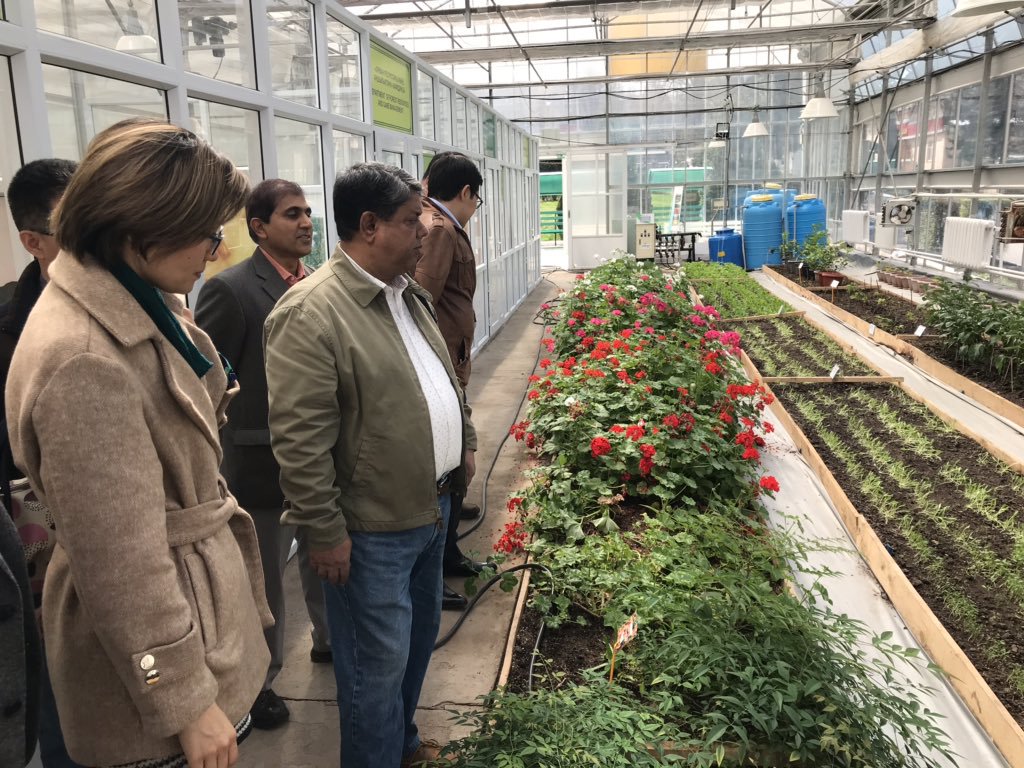Kazakhstan and the state of Ohio share a natural connection to agriculture. Vast natural resources and location in the heart of Central Asia has fueled demand for Kazakhstan’s agricultural products, with investments topping over $1 billion in 2019. In turn, agriculture contributes to more than $105 billion to Ohio’s economy.
The threat of zoonotic diseases, climate change, and global demand for food provide scope for U.S. and Kazakhstan to expand new collaborations in agricultural education, research, and outreach.
With a grant administered by American Councils for International Education and funded by the U.S. Department of State through the U.S. Embassy in Kazakhstan, The Ohio State University’s College of Food, Agricultural, and Environmental Sciences (CFAES) and Kazakh National Agrarian Research University (KazNARU) deepened a partnership on safeguarding animals and agriculture to keep livestock healthy and food safe.
Teamwork for National Research Priorities
Launched as a teamwork concept, the partnership introduced teaching techniques, curricula, and distance learning capacity for applied research and outreach. Cross-disciplinary teaching, graduate research, workshops, and online programs, and demonstrations positioned Ohio as a global agricultural leader and Kazakhstan as an emerging agricultural powerhouse.
In April 2019, Ohio State University scientists and KazNARU peers exchanged ideas during a one-day idea generation and grant writing workshop for the agriculture faculty members, scientists, researchers, and PhD students. KazNARU teaching faculty learned new techniques to deliver and interact with their students more effectively.
“The workshop identified the current and existing agricultural, environmental, and animal science research problems in Kazakhstan, followed by in-depth discussion on team building procedures,” says Dr. Rafiq Islam, director of the Soil Water & BioEnergy program at Ohio State University South Centers in Piketon, who participated in the visit.
As a preeminent knowledge base, KazNARU serves farmers and agricultural enterprises in Kazakhstan to improve upon their growing technology for soybeans, a critical export meeting demand for global protein consumption. Since around half of Ohio cropland yields soybeans, Ohio State University lent its expertise to support KazNARU’s efforts to meet the priorities of Kazakhstan’s agricultural industry.
Dr. Nurlan Kuldybayev, research scholar in plant pathology at KazNARU spent two-months at Ohio State University South Centers in Piketon, Ohio using sophisticated equipment and field experiments to build his research capacity.
“Working with the OSU Soil Organic Matter Calculator, I learned special concepts of soil health components and soil quality,” recalls Dr. Kuldybayev, who brought back a test kit and insights to protect soybean seedlings from crop-destroying fungus.
Mentoring the Next Generation of Agricultural Leaders
Researchers at Ohio State University served as mentors to PhD students at KazNAU in animal health and disease surveillance and climate-smart agriculture. The goal was to develop and exchange joint teaching materials, as well as to build innovative and effective approaches for teaching, research, and extension programs across disciplines.
Dr. Renukaradhya Gourapura, Professor at the CFAES Food Animal Health Research Program and Department of Veterinary Preventive Medicine, formed a collaboration with Dr. Kaissar Tabynov, Head of the International Center for Vaccinology at KazNARU to strengthen ties in food and animal health research. Dr. Tabynov visited Dr. Gourapura’s lab in November 2019 in Wooster, Ohio, and exchanged scientific knowledge of cattle vaccines in Kazakhstan.
The team has been actively involved in collaborative research, which resulted in three peer-reviewed joint research publications in the past two years. Notably, the team won Kazakhstan government funding in June 2020 to develop a novel COVID-19 vaccine for preclinical studies.
Dr. Islam mentored early-career KazNARU faculty members to conduct new experiments in climate-smart agriculture in Kazakhstan. Dr. Zagipa Sapakhova, a researcher in the Department of Plant Protection and Quarantine, won a competitive U.S. Department of Agriculture Norman Borlaug Fellowship at Washington State University in fall 2019 as a result of the mentorship. Ohio State CFAES and KazNARU faculty also jointly submitted research proposals for external funding, including four research proposals and 13 peer-reviewed journal articles.
Ohio State CFAES and KazNARU continue to expand their partnership activity in joint patents and licenses for novel vaccine development to mitigate infectious and zoonotic diseases in food animals, climate-smart agriculture, soil quality restoration, and water-use efficiency.
“Kazakhstan is well ahead in the region in terms of making critical investments to address large scale agricultural and environmental challenges facing the greater Central Asia region,” states Beau Ingle of Ohio State’s International Program in Agriculture. “Kazakh scientists have very good infrastructure to support high-quality research and have demonstrated to be partners capable of collaboratively tackling these challenges that have global implications.”
About The Partners
The Ohio State University College of Food, Agricultural, and Environmental Sciences
The Ohio State University and the College of Food, Agricultural, and Environmental Sciences (CFAES) got its start in 1870, when the Ohio General Assembly established the Ohio Agricultural and Mechanical College. Today, its world-class teaching, research, and outreach impacts local, state, national, and global communities. CFAES focuses on production efficiency and technologies, food security and safety, economic and policy analysis, preservation of the environment, ecosystems, and water quality. CFAES fosters economic development through technologies and value-added products, strives to ensure human, animal, and environmental health, and prepares future leaders and scientists.
Kazakh National Agrarian Research University (KazNARU)
Founded in 1929, the Kazakh National Agrarian Research University (KazNARU) is an innovative oriented institution of higher education, and a leader of the agrarian sector in Kazakhstan and Central Asia. The research university integrates science and industry, creates intellectual property and technology for commercialization, and trains highly qualified staff through basic and applied scientific research and other scientific technical projects. KazNARU has become the core of educational, scientific and innovative environment for Kazakhstan’s country’s competitiveness in agrarian-industrial development.
